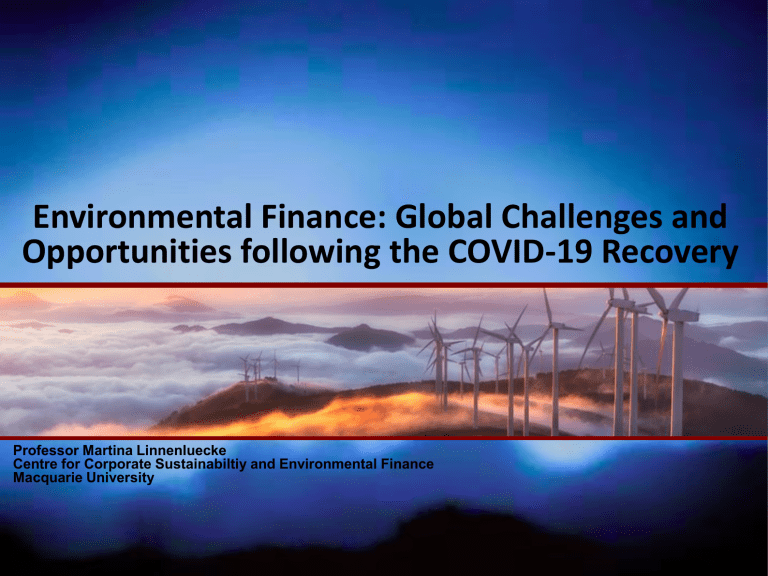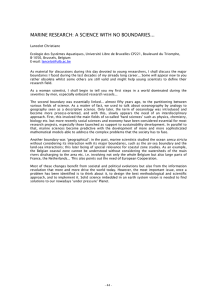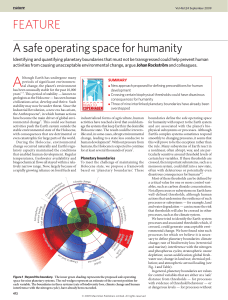
Environmental Finance: Global Challenges and Opportunities following the COVID-19 Recovery Professor Martina Linnenluecke Centre for Corporate Sustainabiltiy and Environmental Finance Macquarie University Setting the Scene 2020 has shows the nature of global interconnected risks • COVID-19 crisis has had significant social and economic impacts • Impacts are likely not isolated but followed by other risks • Current stimulus packages already greatly surpass the rescue packages during the 2007/2008 Financial Crisis Setting the Scene Setting the Scene Business and Global Environmental Change Global Environmental Change U.S. Global Change Research Act of 1990 "Global change" means changes in the global environment (including alterations in climate, land productivity, oceans or other water resources, atmospheric chemistry, and ecological systems) that may alter the capacity of the Earth to sustain life. Sustaining Human Life Steffen et al. (2015) Tipping Points? How far can we go? Is there a tipping point? From a Desirable to an Undesirable State Our precarious predicament Global Environmental Change Threats to Businesses, Assets, Profits, and Human Capital The Impacts on Business What are the planetary boundaries? Climate change What does this mean for businesses? BREACHED Boundary: < 350 ppm CO2 • Limits on carbon emissions; regulatory changes • Clean energy transition Loss of biosphere integrity BREACHED • Pressure from degraded ecosystems (terrestrial, freshwater, marine) • Decline of natural resource inputs (fibre or fuel) Changes to biogeochemical flows nitrogen and phosphorus BREACHED • Restrictions on use of phosphorus and nitrogen, especially in agriculture Land use change BREACHED Release of novel entities Multiple boundaries, yet to be quantified • Possible changes in regulation or restrictions Atmospheric aerosol loading Regionally determined. • Increased regulation Freshwater abstraction Global boundary: 4000 km3 water use/year • Water shortages with implications for waterdependent industries Ocean acidification Boundary: ≥80% of pre-industrial ocean CaCO3 • Impact on commercial fisheries and tourist areas (e.g., Great Barrier Reef) Loss of stratospheric ozone due to CFCs P Boundary: max. 6.2 million tons P/year N Boundary: max. 62 million tons N/year Boundary: no less than 75% biome intactness Boundary: latitude-dependent • Degradation of ecosystems and ecosystem resilience • The discovery of the ozone hole led to stricter standards • Phasing out of ozone-depleting substances Global Environmental Change The Case for Action The Paris Accord At the Paris climate conference (COP21) in December 2015, 195 countries adopted the first-ever universal, legally binding global climate deal. • Global action plan to avoid dangerous climate change and limit warming to well below 2°C • The Paris Agreement entered into force on 4 November 2016 • Key elements – mitigation (selfdefined mitigation goals beginning in 2020), adaptation, loss and damage, support for developing countries • US exits today (Nov 4, 2020) COVID-19 Impacts Significant worldwide impacts • Initial global slowdown of emissions and pollution • Significant economic rescue measures, focus on green recovery and substantial increase in recent carbon neutral announcements • Long-term impacts of large-scale government injections in the economy to be seen COVID-19 Stimulus Leading economies have announced “Green Recovery” Plans Green Recovery Leading economies have announced “Green Recovery” Plans Example: The European Union • Recovery and Resilience Facility: financial support for investments and reforms, including in relation to the green and digital transitions and the resilience of national economies, linking these to the EU priorities • A top-up of the current cohesion policy programs between now and 2022 under the new REACT-EU initiative • A proposal to strengthen the Just Transition Fund, to assist Member States in accelerating the transition towards climate neutrality. • A €15 billion reinforcement for the European Agricultural Fund for Rural Development to support rural areas in making the structural changes necessary in line with the European Green Deal and achieving the ambitious targets in line with the new biodiversity and Farm to Fork strategies. • Kick-starting the EU economy by incentivising private investments (incl green and digital transition) • Future crisis preparedness (Health, resilience, green and digital transitions) Financial Shareholder Threat Case … Shareholder pressure… Divestment Linnenluecke, M.K., Smith, T., et al. (2015). Divestment from fossil fuel companies: confluence between policy and strategic viewpoints. Australian Journal of Management, 40(3): 478-487. Research Topics Ongoing research Linnenluecke, M. K., Birt, J., Lyon, J., & Sidhu, B. K. (2015). Planetary boundaries: implications for asset impairment. Accounting & Finance, 55(4), 911-929. Ding, A., Daugaard, D., & Linnenluecke, M. K. (2020). The future trajectory for environmental finance: planetary boundaries and environmental, social and governance analysis. Accounting & Finance, 60(1), 3-14. Stranded Assets The Business Opportunity Case … Business Opportunities… Research Topics Post-COVID Outcomes Brammer, S., Branicki, L., & Linnenluecke, M. (2020). COVID-19, Societalization and the Future of Business in Society. Academy of Management Perspectives Summary and Podcast: https://journals.aom.org/doi/full/10.546 5/amp.2019.0053.summary Research Topics Valuing Opportunities Clean Technology good news Linnenluecke, M. K., Han, J., Pan, Z., & Smith, T. (2019). How markets will drive the transition to a low carbon economy. Economic Modelling, 77, 42-54. cash flow abandon good news bad news abandon • Estimates of total wealth creation through cleantech patent development are in the range US$10.16 to US$15.49 trillion invest good news bad news abandon good news bad news abandon bad news Earth at Night Contact Centre for Corporate Sustainability and Environmental Finance ccsef@mq.edu.au Professor Martina Linnenluecke martina.linnenluecke@mq.edu.au

